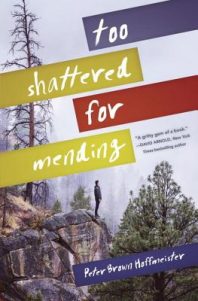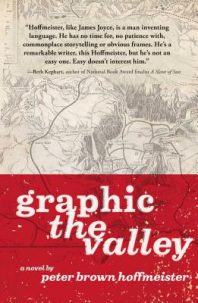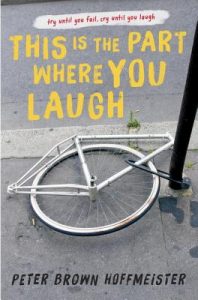 Hoffmeister writes a gritty southern gothic novel; even though it takes place in the small town of Pierce, Idaho, the goings-on there would fit snugly in the south. This is technically a young adult book, but so dark it seems a much better fit to tag it as adult literature. Hoffmeister’s characters, cousins Little and Willa, are trapped in a home life full of despair; child neglect and abuse, poverty, crime, and drug running are realities in their lives. When their Grandfather, Big, goes missing, things become even more complex, and they try desperately to navigate their way through this strange new existence. Hoffmeister’s characters are so damaged, it makes your heart ache for them. With quiet prose and an unrelenting sense of dread, Too Shattered for Mending is a beautiful, poignant nod to the wounded and unmendable among us.
Hoffmeister writes a gritty southern gothic novel; even though it takes place in the small town of Pierce, Idaho, the goings-on there would fit snugly in the south. This is technically a young adult book, but so dark it seems a much better fit to tag it as adult literature. Hoffmeister’s characters, cousins Little and Willa, are trapped in a home life full of despair; child neglect and abuse, poverty, crime, and drug running are realities in their lives. When their Grandfather, Big, goes missing, things become even more complex, and they try desperately to navigate their way through this strange new existence. Hoffmeister’s characters are so damaged, it makes your heart ache for them. With quiet prose and an unrelenting sense of dread, Too Shattered for Mending is a beautiful, poignant nod to the wounded and unmendable among us.
–Dianah H., Powells.com, Portland, OR
Local Shelf: Words tightly focused
by Brian Juenemann for The Register-Guard

Peter Brown Hoffmeister
Peter Brown Hoffmeister is “incapable of writing long chapters” — his own words. He may have said it with cheeky self-deprecation at his Sept. 13 Tsunami Books release party, but it’s not a shortcoming. It takes an incredible amount of skill to convey so much with such economy.
Hoffmeister’s first two novels, Graphic the Valley and This is the Part Where You Laugh, displayed his proclivity for short sectioning his stories, but it’s his third novel, Too Shattered for Mending, where these quick bursts seem particularly focused, as if the author channeled vivid visions to the page.
 In single and double pages, rarely more than three or four, these vignettes, jumping back and forth through time and covering many years, serve the story one essential piece at a time. As readers, we frantically click the elements into place, near desperate for a complete picture of Gavin “Little” McCardell, who lives on the edge of a cemetery and amongst ghosts.
In single and double pages, rarely more than three or four, these vignettes, jumping back and forth through time and covering many years, serve the story one essential piece at a time. As readers, we frantically click the elements into place, near desperate for a complete picture of Gavin “Little” McCardell, who lives on the edge of a cemetery and amongst ghosts.
This is not a story of the supernatural. It’s northern Idaho.
Following his book release reading, Hoffmeister agreed to answer some questions for The Local Shelf.
Local Shelf: The book opens with a five-line chapter, a five-line rush of senses and revelation. The second chapter goes a whopping full page, and it built upon a line about the smell of water.
This is poetry, I said to myself. Did you intentionally invoke the poet in you with this book or did the story just demand it to be leached from your bones and onto the page?
 Peter Brown Hoffmeister: I always wanted to be a poet but wasn’t particularly talented. I studied poetry with Dorianne Laux at the U of O, and I owe a lot of my poetic development to her and to the poets I’m constantly reading, Patricia Smith, Claudia Rankine, Michael McGriff …
Peter Brown Hoffmeister: I always wanted to be a poet but wasn’t particularly talented. I studied poetry with Dorianne Laux at the U of O, and I owe a lot of my poetic development to her and to the poets I’m constantly reading, Patricia Smith, Claudia Rankine, Michael McGriff …
The novel’s narrator isn’t an academic — not by any means — but he’s poetic nonetheless. He’s working-class poetry embodied, and his descriptions just came out of who he was.
LS: Most people are familiar with the sensation of waiting for the other shoe to drop. As this story progresses, it seems increasingly likely that we will experience resolution only when the final chicken falls. The chicken countdown is a brilliant device, full of practical and symbolic importance in Little’s life (readers, you’ll just have to find out for yourselves). How did you come up with it?
PBH: My family always had chickens when I was growing up, and I found a lot of dead chickens. There were also a lot of chicken disappearances or chicken mysteries. In the draft stage of the book, I had a little bit of the “chicken countdown” going and my editor loved it. She said it was important and that I had to take it further. So I did, and it became a larger metaphor.
LS: Hunting and fishing, handy-man renovation, Trick Mix, wrought iron patch compound, “Law & Order SVU,” bird behavior, knock-knock jokes, hip-hop. How in the world did you become so seemingly expert at all of these elements in this one book? I cannot imagine the breadth of research you undertook. This can’t all be Google!
PBH: I’ve hunted and fished outside of Pierce (Idaho), where the book is set, done handy-man renovations, made Trick Mix and Super Meal, and I’ve sat and talked to a guy fixing wrought iron and graves in a graveyard. Also, my wife loves watching “SVU,” I love watching birds, and hip-hop is definitely my favorite genre of music. For something to be real, you have to live it.
LS: You revealed in your book release reading that your character Mrs. Trepp was inspired by the story of a local man, but did it ever occur to you that this mysterious-to-the-point-of-scary woman, ominously rolling down the road past the trailer, was a lot like Miss Gulch, from “The Wizard of Oz” film?
PBH: Strangely enough, I don’t know “The Wizard of Oz,” so it’s certainly not based on Miss Gulch. These things happen. Twenty years ago, my fiction thesis reader at the U of O said how much my draft reminded him of Huck Finn. But I hadn’t read that novel yet. So maybe themes and voices recur without direct influence?
LS: I’m fascinated by the red transparent sheet Little lays over his homework to try and block out the noise and focus his eyes and brain into cohesion and understanding. What’s your experience with this method?
PBH: I owe all of my knowledge of Little’s learning struggles to my good friend Hira Shamsuddin. She told me about her experiences in school, using a red cover sheet, and how some accommodations still weren’t enough. For people like her (and Little) — who are brilliant in nontraditional ways — standardized schooling is a terrible experience. I hope that our educational system will eventually meet a more diverse student population.
LS: Someone in the audience at your Tsunami reading asked you a question about the development of this book’s story line. You responded that you try not to write the ending until the ending and try not to know the ending before the ending, and that with this book you honestly had no clue — that is, until you experienced a revelatory moment and immediately knew “That’s what happened.”
Terrible things do happen along the way, but with so many pitfalls pocking the way for these kids, there always seemed a possibility that the whole lot might disappear into the abyss. Did your own story end up making you feel better, maybe a bit relieved from what you might have been prepared for?
I am certainly glad that your hopeful heart was at the center of that revelation!
PBH: It’s true that I try not to know my own books’ endings. That allows for mystery for me and for the reader. With Too Shattered For Mending, I tried to think of realistic possibilities, and there were quite a few. I’m a hopeful and optimistic person, but that doesn’t always translate to the page, and I have to go with what feels most right for each character and situation.
LS: Real — check. Right — check. Phenomenal — check.


